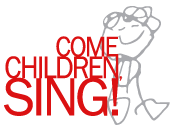You read storybooks to your child and your little one not only learns the stories, sometimes verbatim, but discovers that print carries meaning. Your little one also observes “reading behaviors.” You turn pages, read left to right and top to bottom, read expressively, and tell a story. “Being read to” is an important part of the process of learning to read. Your little one imitates your “reading behaviors” by “reading” the story independently, turning pages, telling a familiar story expressively, and perhaps pointing to the print. Whatever is on your little one’s mind will be delivered as the story, rather than what is in print. Your child is “making meaning” out of print—the essence of reading.
Learning to read music is much the same. You read CCS Rhythm and Tonal Storybooks to your child and your little one learns the “stories” and discovers that notation carries musical meaning. Your child observes “music reading behaviors” from the computer and from you, and imitates your music reading behaviors by, “reading” the Rhythm or Tonal Story independently, chanting a familiar chant or song expressively, and pointing to the notation, as if following it’s every implication. Whatever is on your little one’s musical mind is what will be delivered as the story, rather than what is in the notation. Your child is “making musical meaning” out of notation—the essence of music reading.
The process of music reading is not one of naming notes, labeling lines and spaces, quarter notes or eight notes, nor computing mathematical relationships. It is not a process of “decoding” notation, but rather, one of bringing rhythm knowing and tonal knowing to notation in order to make musical meaning. Teaching a child to identify notes or time values and then assuming the child is reading music is like teaching a child to identify characters in a language he doesn’t understand and assuming he is reading the language. Labeling note names and note values are functions of the thinking mind, not the musical mind, and thinking gets in the way of the musical mind.
|

